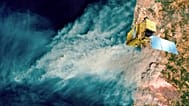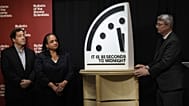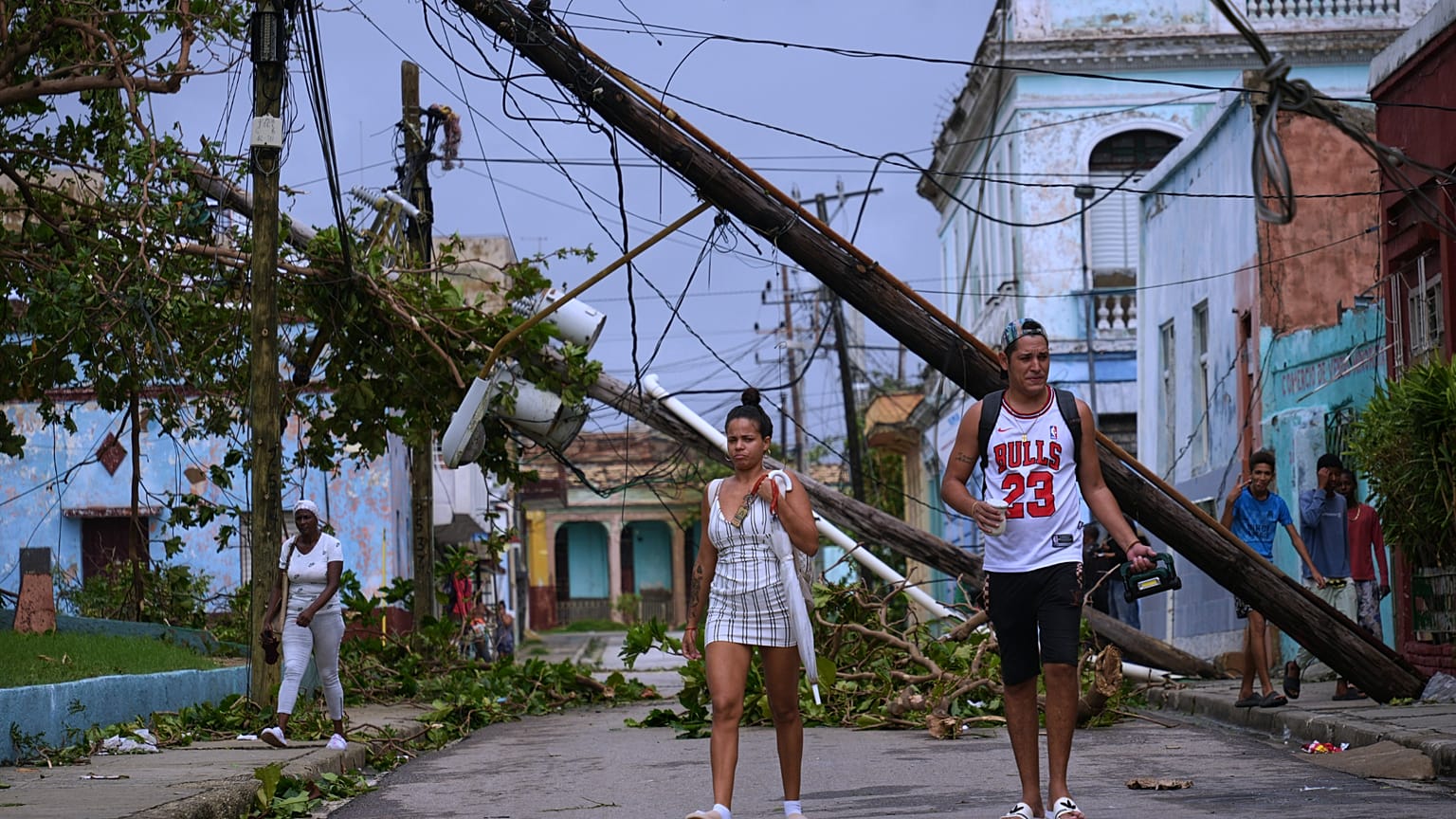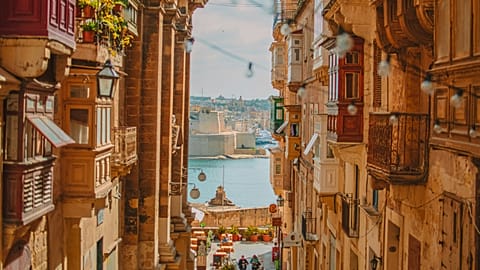Hundreds of travellers are still waiting for flights out of Jamaica and are warned of food and accommodation shortages.
All 25,000 international tourists who were in Jamaica when Hurricane Melissa made landfall on 28 October are accounted for and in good health, according to tourism minister Edmund Bartlett.
Hundreds are still waiting for flights out of the country as airports were closed by what quickly became the strongest storm in the world this year, as well as the worst to hit Jamaica in decades.
Europe's largest holiday company TUI has cancelled all package holidays to Jamaica until 9 November.
The hurricane has caused severe damage and flooding across the northern Caribbean, with the confirmed death toll standing at 49.
Jamaica airport reopens with continued cancellations
Jamaica shut its two main international airports, Sangster International Airport in Montego Bay and Norman Manley International Airport in Kingston, in anticipation of the hurricane.
At Sangster International Airport, all arriving and departing flights remain cancelled. The structure suffered damage, but Bartlett said it hopes to reopen in the next two days.
“Following the passage of the hurricane, a comprehensive assessment of the airport will be conducted to determine when it is safe to resume operations. Updates will be communicated promptly,” Sangster International Airport said in a post on X on Sunday.
“When the airport reopens, passengers are asked to confirm their flight status with their airlines before travelling to the airport.”
The Norman Manley International Airport has announced its reopening on X. On Wednesday, it allowed relief flights to land, while commercial services recommenced on Thursday morning.
Schedules continue to be disrupted, with a few cancellations and delays between today and tomorrow, according to FlightRadar24.
"Passengers are strongly advised to confirm your flight status with your airline before travelling to the airport, as schedules may have been modified," the airport wrote on X.
It urged travellers to arrive at the airport earlier than usual for departing flights to allow for check-in and security procedures.
Passengers stranded as airports and ports closed
Hundreds of travellers remain stranded on the island, including those on package holidays. Europe's largest holiday company TUI informed travellers that flights home would be delayed by a few days as they continue to monitor the travel situation.
On Wednesday, the company flew two empty aircraft to a nearby Caribbean airport in preparation for picking up UK holidaymakers once Jamaican airports reopen.
TUI has now cancelled all package holidays to Jamaica until 9 November.
Virgin Atlantic have also cancelled all holidays up to and including 4 November. The company is also offering extra flexibility for customers with original departures up to 10 November, waiving admin fees for any modifications.
Jamaican ports are also currently closed to shipping and cruise ships, with several cruise lines like Carnival Cruise Line and Royal Caribbean already having cancelled stops at the island and rerouted ships to other ports in the Caribbean.
How can stranded travellers in Jamaica stay safe?
Despite Melissa moving on to other Caribbean islands, stormy weather is likely to continue throughout the next few days.
Both Jamaican and international officials have issued multiple warnings to travellers to find somewhere safe or stay where they are until the hurricane passes completely, due to power lines being down and ongoing flooding.
The Jamaican government also has a list of availablehurricane shelters for travellers worried about finding safe shelter.
The UK Foreign Office has warned that it may take some time for airports to reopen and that travellers should be prepared for shortages of food, accommodation, water and health services after the hurricane has passed.
The Jamaican government also advises holidaymakers on package tours to follow their tour operator’s advice.
Travellers on the island are urged to continue to monitor local and international weather updates, including from the Meteorological Service for Jamaica and the US National Hurricane Centre, and follow the guidance of local authorities, especially in the event of any evacuation orders.
Traveller advice for refunds and insurance claims
Travellers whose flights or package holidays have been cancelled by the airline or tour operator should be able to receive a full refund. However, insurance providers are not responsible for covering other associated costs such as hotel stays due to this disruption.
Holidaymakers who choose not to travel to Jamaica, even if the airline, tour operator or accommodation has not cancelled bookings, may not be eligible for reimbursement or compensation.
This is because, without an official ‘no-go’ warning from your government, this is considered “disinclination to travel”.
Travellers can claim on their travel insurance for disruption, as long as they bought it before the storm was named.
"Travel insurance is only designed to cover the unforeseen. Once a storm is named, you can no longer buy a policy that covers that storm. As of 21 October, it was too late to purchase travel insurance for Hurricane Melissa, because that’s when it was officially named as a storm," explain travel experts at insurance comparison site Squaremouth.
If you purchased travel insurance before Melissa was named, itcan cover your financial losses if your trip is cancelled due to severe weather.
Specifically, travel insurance reimburses all of your prepaid and non-refundable travel expenses, like flights, cruises, hotel accommodations, and event tickets.
However, for coverage to apply, one of the following specific situations must occur:
- Your destination is uninhabitable due to a hurricane or damage from a storm
- Your destination is inaccessible due to a hurricane
- Your airline or cruise line has cancelled your trip because of a hurricane
- There’s a hurricane warning at your destination
- There’s a mandatory evacuation at your destination due to a storm
- Your home has been directly damaged by a hurricane
Hurricane Melissa strongest storm on the planet this year
Hurricane Melissa is the worst storm in the world so far in 2025, having already caused 19 deaths in Jamaica, another 30 in Haiti and one in the Dominican Republic.
It has been dubbed the “storm of the century”, and experts believe that ongoing climate change has driven much of Melissa's rapid escalation, with the storm feeding on increasingly warmer ocean temperatures.
“We’re seeing a direct connection in attribution science with the temperature in the water and a climate change connection," says Bernadette Woods Placky, chief meteorologist for Climate Central, a combination of scientists and journalists who study climate change.
”And when we see these storms go over this extremely warm water, it is more fuel for these storms to intensify rapidly and push to new levels."
Jamaica’s high mountains have likely exacerbated Melissa’s rains. As it is a slow-moving hurricane, there are also higher chances of more rainfall in concentrated areas, greatly increasing the chances of flooding.


















